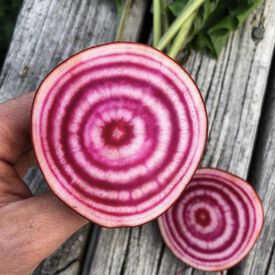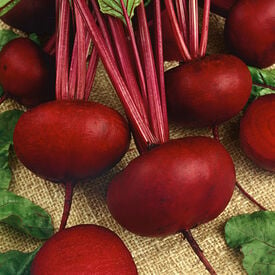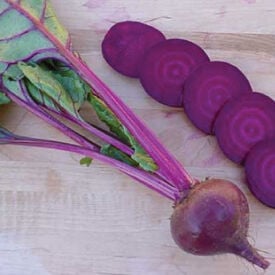The White Albino beet plants produce good yields of very sweet white beets. The beets are white and will never stain again! This gourmet beet is ideal for boiling, pickling, baking, and freezing.
The Avalanche beet, scientifically known as Beta vulgaris var. conditiva 'Avalanche,' is a popular variety of beetroot that has gained recognition for its exceptional characteristics. Historically, beets have been cultivated for thousands of years, with evidence of their consumption dating back to ancient civilizations like the Egyptians and Greeks. The Avalanche beet is a modern cultivar that has been selectively bred for its unique attributes. Avalanche beets are renowned for their mild, sweet flavor and tender texture. They are typically harvested at a smaller size, around 2-3 inches in diameter, making them ideal for salads, roasting, and pickling. The days to maturity for Avalanche beets range from 45 to 50 days, making them a relatively quick-growing crop. These beets are characterized by their crisp, pure white flesh and skin, giving them their distinctive appearance. They are also known for their resistance to common beet diseases such as Cercospora leaf spot and Rhizoctonia root rot, which can help ensure a healthy yield. When growing Avalanche beets, it's essential to provide them with well-draining, loose soil that is rich in organic matter. They thrive in full sun but can tolerate partial shade. Proper spacing is crucial, with rows spaced about 12-18 inches apart and individual beets planted 2-4 inches apart within the rows. Adequate watering is necessary to keep the soil consistently moist, but not waterlogged. With the right care and growing conditions, Avalanche beets can yield an abundant harvest of these delightful, mild-flavored, and visually striking vegetables.
The Crosby Egyptian Beet, a classic heirloom variety, has a rich history dating back to the late 19th century. Originating in Egypt, it was introduced to the United States in the 1860s and quickly gained popularity among gardeners and farmers. This beet variety has stood the test of time due to its exceptional taste and versatility in the kitchen. Crosby Egyptian Beets are known for their sweet and tender flesh, making them a favorite for both raw and cooked applications. They have a distinct earthy flavor with a hint of sweetness, making them perfect for salads, pickling, roasting, and even juicing. These beets typically mature in about 55-60 days, making them a relatively quick-growing option for gardeners. In terms of appearance, Crosby Egyptian Beets are small to medium-sized, usually reaching about 2-3 inches in diameter. They have a round to slightly flattened shape and a vibrant deep red or purplish skin. Disease resistance is moderate, with some resistance to common pests and diseases like aphids and leaf miners. In terms of yields, you can expect a good harvest of beets from each plant, especially if you space them adequately (about 2-4 inches apart) in well-drained soil with full sun to partial shade. These beets thrive in cool weather conditions, making them suitable for spring and fall planting. With its rich history and delightful flavor, the Crosby Egyptian Beet continues to be a treasured addition to vegetable gardens.
Chioggia beets, also known as Candy Cane or Bull's Eye beets, are a unique and visually striking variety of beets that originated in Italy. Their history dates back to the early 19th century when they were first cultivated in the coastal town of Chioggia, near Venice. These beets are renowned for their vibrant and eye-catching appearance, characterized by concentric rings of alternating red and white colors, reminiscent of a candy cane. This distinct coloration makes them a popular choice among gardeners and chefs for their ornamental and culinary appeal. In terms of taste, Chioggia beets offer a mild and slightly sweet flavor, making them a versatile ingredient in various dishes. They can be enjoyed raw in salads, pickled, roasted, or boiled, and their taste becomes sweeter when cooked. Typically, Chioggia beets are round to slightly flattened in shape, with a diameter of 2 to 3 inches. They are known for their relatively quick maturity, taking around 50 to 60 days to reach full size. Their unique coloration is retained even after cooking, making them a visually stunning addition to any meal. When it comes to growing Chioggia beets, they thrive in well-drained soil with a neutral pH and require full sun for optimal growth. Proper spacing is essential to allow room for their roots to develop, typically requiring 3 to 4 inches between each plant and rows spaced about 12 to 18 inches apart. Chioggia beets are relatively disease-resistant, with a natural ability to withstand some common beet diseases, but it's still essential to monitor them for any signs of issues. With proper care, Chioggia beets can yield a bountiful crop, and their unique appearance and delightful taste make them a favorite among gardeners and culinary enthusiasts alike.
The Crosby Egyptian beet is a standard early bunching beet for table or market, a favorite that is now also available in organic seeds. The flattened heart-shaped roots and dark-red flesh of this beet is equally appetizing as it is beautiful. The Crosby Egyptian is also the largest early variety beet and will keep its shape until fall. Enjoy both the roots and the tops chopped up in a salad! Certified Organic. Learn more about our organic seeds.
The Early Wonder beet is a popular heirloom beet plant that produces high yields of deep red roots! A popular beet that is tasty, early maturing and produces abundant greens. The beets are great for boiling, pickling, baking, and freezing. Forms 3-4" deep red globes that are sweet and tender. Also known as "Tall Top" for its tall, glossy leaves that make great greens with salads. Greens are also a great substitute for chard or spinach and have high vitamin A and C.
The Ruby Queen is an excellent canning and fresh eating beet! A perfectly round beet that has a smooth buttery texture that is more tender than any other beet. An early maturing beet, 52 days, that grows well in any soil type throughout the country. Ruby Queen can be grown close because they hold their shape well. They can also be grown larger than most beets and still hold good flavor making it a great market beet. An All American Selection winner!
The Detroit Dark Red is the standard all-purpose heirloom beet! This is by far the most popular beet for home gardens. Detroit Dark Red has blood red flesh that is very sweet and tasty. Beets are perfectly round with no rings or streaks. Has 13-16" greens that are wonderful mixed into salads. Very prolific and good keeper. This heirloom was first introduced in 1892 by Mr. Reeves of Ontario, Canada.
The Lutz Green Leaf White Stem Beet is an attractive deep red variety with white stalks that is absolutely delicious when steamed or roasted. This beet is known for having huge glossy, deep green tops that are perfect for salads! This beet is a "winterkeeper" beet that has a long standing storage capability. The Lutz Green Leaf White Stem has 6 inches in diameter roots.
Red Ace Beet seeds produce one of the most reliable and widely grown hybrid beet varieties, developed in the 1970s for uniformity, earliness, and adaptability. Known for their smooth, globe-shaped roots with vibrant red flesh and minimal zoning, Red Ace beets mature quickly—often in just 50 days—making them a favorite for both home gardeners and market growers. The tops are tender and flavorful, doubling as nutritious greens, while the roots offer a sweet, earthy taste that remains consistent even when grown in varying climates. Easy to cultivate, they thrive in full sun and well-drained, loose soil, with regular watering encouraging optimal growth. Their excellent disease resistance, high yields, and ability to hold sweetness even when larger make them an ideal choice for fresh eating, roasting, pickling, or juicing.
The Lutz Green Leaf Red Stem Beet has a beautiful deep red hue and a mouth watering taste that pairs perfectly with any dish. This variety is known for having huge glossy, deep green tops that are amazingly delicious! This beet is a "winterkeeper" beet that has a long standing storage capability. The Lutz Green Leaf Red Stem has 6 inches in diameter roots.
The Rainbow Blend contains a kaleidoscope of orange, purple, red, white and multi-colored beet varieties that will make any dish pop! This colorful variety not only produces the brightest colored beets, but also the tastiest. This blend is a great addition to any garden, especially a container garden. Enjoy this beet blend in a salad, or roasted for a mouthwatering colorful plate.
The Golden Detroit is the ultimate savory golden beet with delicious greens! A colorful beet that won over gardeners with it's sweet but more mild flavor. Golden Detroit's vibrant orange-yellow color makes a wonderful addition to salads and meals. Cooked it turns buttercup yellow and melts in your mouth. Light green, with gold veined leaves also mix well into salads. One of the best tasting raw beets that is extremely healthy.
Lutz Green Leaf Pink Stem beet seeds are prized for producing beets with distinctive characteristics and exceptional flavor. This variety features vibrant green leaves with a striking pink stem, which adds a splash of color to any garden. The beets themselves are known for their smooth, round shape and tender, sweet, deep red to purple flesh. Lutz Green Leaf Pink Stem beets are valued not only for their aesthetic appeal but also for their excellent taste, making them a popular choice for salads, roasting, and pickling. They are known for their adaptability, growing well in various soil conditions, and for their relatively long harvest window, allowing for a prolonged period of fresh, nutritious beets. Additionally, the green leaves are edible and nutritious, providing a dual-purpose crop that enhances both the visual and culinary appeal of your garden. This variety is a "winterkeeper" beet that has a long standing storage capability. The Lutz Green Leaf Pink Stem has 6 inches in diameter roots, make sure to thin them out to 4-6 inches.
Bull's Blood beet, scientifically known as Beta vulgaris, is a striking and versatile variety of beetroot that has gained popularity for its unique characteristics. This heirloom variety has a fascinating history, dating back centuries to Europe, where it was initially cultivated for its edible leaves rather than the root. Its name, "Bull's Blood," is derived from the deep burgundy-red color of its leaves, which resemble the color of ox blood. Over time, its sweet and earthy flavor profile has made it a favorite among chefs and home gardeners alike. In terms of appearance, Bull's Blood beets typically grow to a medium size, roughly 2-3 inches in diameter, and have a round to slightly flattened shape. The seeds of this variety are easy to come by and can be sown directly in the garden or started indoors. Bull's Blood beets are relatively quick to mature, taking about 50-60 days from seed to harvest. The leaves are a deep red, while the root itself is a dark purplish-red, making it visually appealing on the plate. Bull's Blood beets exhibit some resistance to common beet diseases like Cercospora leaf spot and Downy Mildew, although specific resistance levels may vary depending on growing conditions. When properly cared for, they can yield a plentiful harvest. To ensure optimal growth, it's recommended to space the beet plants about 2-4 inches apart in well-drained soil with full sun exposure. Adequate moisture and consistent watering are essential for healthy growth. Whether you're looking to add a pop of color to your garden or enhance your culinary creations, Bull's Blood beets are a delightful choice with a rich history and vibrant character.















